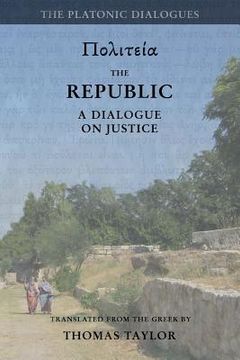Synopsis "Plato: The Republic: A Dialogue Concerning Justice"
The present edition of Plato's "Republic" is a reproduction of the translation completed by Thomas Taylor. Stephanus numbers have been added to the original text for easy reference. Also included are Taylor's introduction, copious notes, and an Apology for the Fables of Homer by Proclus, introducing the 2nd and 3rd Books of the Republic. This is the third book in a series of publications reproducing the Works of Plato. The first volume in this series reproduced Taylor's "General Introduction to the Philosophy and Writings of Plato" (ISBN: 9781530752379) and the second reproduced Taylor's translation of the "First Alcibiades" (ISBN: 9781530843312) From the Foreword: The topic of discussion, throughout all ten books of the Republic, is Justice-justice in the polity of the city-state, and justice as a virtue of our soul. The key feature of this dialogue, the thread that binds it together from beginning to end, is the correspondence between these two. "The design of Plato, says Proclus, in this dialogue, is both concerning a polity and true justice, not as two distinct things, but as the same with each other. For what justice is in one soul, that such a polity as is delineated by Plato is in a well inhabited city." (Taylor) The Republic opens with an exploration of what is best or most beneficial for man: to be just or to be unjust. While on the surface this may seem, morally at least, to be a simple question with a simple answer, strong arguments are made for the benefits of acting unjustly, especially if one is able to simultaneously act unjustly and gain the reputation of a just man: for in such a case, one will procure all that can be gained from unjust actions (increased wealth, position, power, etc.) while facing none or very few of the common disadvantages of being unjust (punishments, low public opinion, etc.). It is argued, one might say quite fairly based on common experience, that justice is rarely pursued for the sake of justice itself, but rather for the perceived benefit to the individual, i.e. the common man only seeks justice if they find there to be some personal advantage in doing so. Socrates addresses these fundamental questions and the several arguments levelled against justice in the opening book of the Republic, and demonstrates, with clear and detailed reasonings, several of the glaring deficiencies in these arguments. The question of whether justice is truly better than injustice is not left to such initial reasonings, however, as Socrates's companions urge him into the greater depths of the subject. This naturally opens the dialogue to a fuller exploration of the nature of justice: what it is, what relation is has to our soul, to our city, and so on. The dialogue thus treads through much territory, centering initially around an ideal construction of a just city, while using the knowledge gained through its analysis to shed light on the role of justice in each individual. It passes on to a definition and unveiling of the nature of a true philosopher, and their proper role in such a just city, and from there to an exploration of the forms of polity and their correspondence with types of men (i.e. Timocratic, Oligarchic, Democratic, Tyrannic), relating the conditions and attitudes of each polity to the same conditions and attitudes within the corresponding man. Book 9 provides what may be viewed as a conclusion on what is better: justice or injustice, covering three major points of argument. The close of the dialogue (Book 10) presents us with something a little different: a view of the immortality of the soul and a vision of death and rebirth, complete with postmortem judgment and necessity, corresponding with the common "eastern" notions of karma and reincarnation. Here we see justice and injustice dealt with in direct relation to the immortal soul, beyond the realm of worldly utilitarianism.

